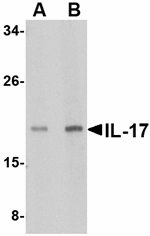![Sandwich ELISA analysis of mouse IL-17A protein using GTX02962 IL17A antibody [IL17-I] as coating antibody and GTX02963-02 IL17A antibody [MT2270] (Biotin) as detecting antibody. Sandwich ELISA analysis of mouse IL-17A protein using GTX02962 IL17A antibody [IL17-I] as coating antibody and GTX02963-02 IL17A antibody [MT2270] (Biotin) as detecting antibody.](https://www.genetex.com/upload/website/prouct_img/normal/GTX02963-02/GTX02963-02_20210507_ELISA_w_23053123_288.webp)
Sandwich ELISA analysis of mouse IL-17A protein using GTX02962 IL17A antibody [IL17-I] as coating antibody and GTX02963-02 IL17A antibody [MT2270] (Biotin) as detecting antibody.
IL17A antibody [MT2270] (Biotin)
GTX02963-02
ApplicationsELISA
Product group Antibodies
ReactivityMouse
TargetIl17a
Overview
- SupplierGeneTex
- Product NameIL17A antibody [MT2270] (Biotin)
- Delivery Days Customer9
- Application Supplier Note*Optimal dilutions/concentrations should be determined by the researcher.Not tested in other applications.
- ApplicationsELISA
- CertificationResearch Use Only
- ClonalityMonoclonal
- Clone IDMT2270
- Concentration0.5 mg/ml
- ConjugateBiotin
- Gene ID16171
- Target nameIl17a
- Target descriptioninterleukin 17A
- Target synonymsCtla-8, Ctla8, IL-17, IL-17A, Il17, interleukin-17A, cytotoxic T-lymphocyte-associated antigen 8
- HostMouse
- IsotypeIgG1
- Protein IDQ62386
- Protein NameInterleukin-17A
- Scientific DescriptionThis gene encodes a pro-inflammatory cytokine that is a member of the interleukin-17 family. The encoded protein plays a central role in host defense against diverse pathogens. The encoded protein is produced by activated T-cells and certain cell types of innate immune system. The active protein functions as either a homodimer with other interleukin-17 family members and signals through the interleukin-17 receptor to induce inflammatory cytokine production. Aberrant expression of this gene is associated with autoinflammatory diseases including rheumatoid arthritis, psoriasis and multiple sclerosis. [provided by RefSeq, Sep 2015]
- ReactivityMouse
- Storage Instruction-20°C or -80°C,2°C to 8°C
- UNSPSC41116161





![Sandwich ELISA analysis of mouse IL-17A protein using GTX02962 IL17A antibody [IL17-I] as coating antibody and GTX02963-02 IL17A antibody [MT2270] (Biotin) as detecting antibody.](https://www.genetex.com/upload/website/prouct_img/normal/GTX02962/GTX02962_20210507_ELISA_w_23053123_866.webp)